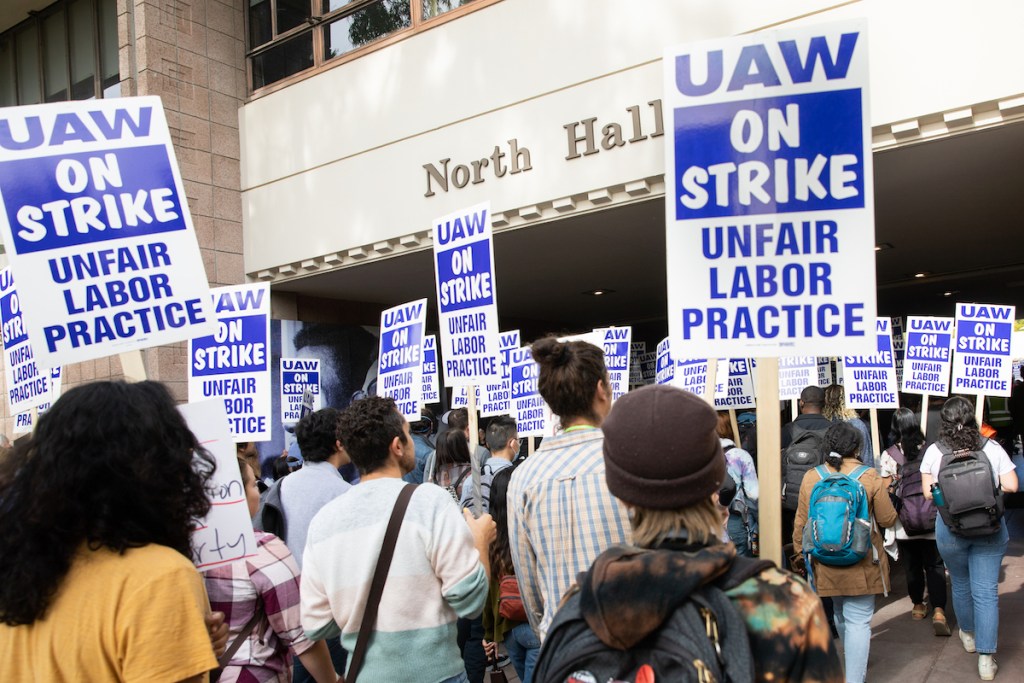After 15 days of protests, 12,000 of the 48,000 University of California academic workers on strike are getting what they bargained for. But that does not mean they are ready to abandon the remaining 36,000 student workers still on the picket line.
On Monday night, postdoctoral scholars and academic researchers at UC reached tentative, five-year contract agreements that address key union concerns, including wage increases that reflect the cost of living.
It’s a big win for those 12,000 employees; most postdocs will receive a 20-23 percent salary increase (up to $12,000) by October 2023, and a typical academic researcher will receive about 29 percent in salary increases over the life of the contract. Academic researchers hired in July 2022, for example, depending on their position, would see an increase in compensation of $3,078 to $5,459 by July 2023, and a total increase of $19,423 to $20,620 by the end of the contract, bringing their total salaries up from $49,000-$56,600 to $69,620-$76,423.
“Our dedicated colleagues are vital to UC’s research activities, and we are very pleased to have reached agreements that honor their many important contributions,” said Letitia Silas, UC executive director of system-wide labor relations.
However, the other 36,000 student workers on strike, including graduate student teaching assistants, tutors, and student researchers, are still waiting at the bargaining table. The day of the announcement also marked the 12th day since student researchers had submitted their latest wage proposal to the UC, with no response.
While union membership reviews the contracts and votes on whether or not to ratify the agreements, union officials say that academic researchers and postdocs will remain on strike in sympathy with their two fellow bargaining units.
“We are proud to have reached agreements that address the soaring cost of living, and reflect the value of our contributions at UC,” said Neal Sweeney, president of UAW Local 5810, the union representing postdocs and academic researchers. “These agreements represent a new, best-in-class model that will improve quality of life — and the quality of research — for scientists across the U.S. It is now time for UC to make serious proposals to Academic Student Employees and Student Researchers and to reach fair agreements that recognize the contributions these workers make.”
Sign up for Indy Today to receive fresh news from Independent.com, in your inbox, every morning.
At a press meeting on Tuesday, Sweeney said that the timeline for ratification of the agreements is still being worked out, but that the process “will probably start later this week or next week.” If the contracts pass by a simple majority vote, he said, postdocs and academic researchers will end their strike, but for now, they are remaining on the picket line in solidarity.
“While it is a simple majority, I know I would like to see a stronger majority of folks who are signing on and voting yes on this contract,” said Stacey Frederick, an academic researcher at UC San Francisco and a bargaining team member at UAW 5810. “Looking at what we had before we went into bargaining and before the strike, and what we’re coming up with on this contract, there’s some pretty amazing changes that will help protect not just things around compensation, but to make our workplace one of the most safe and effective spaces in academia.”
Frederick said she is confident that the contracts will be ratified. Along with increases to compensation, the agreements guarantee free transit passes, e-bike discounts, increased childcare subsidies, increased protections for workers with disabilities, longer appointments for better job security, and eight weeks of parental and family leave paid at 100 percent.
Negotiations are still ongoing for student researchers and academic student employees. While some progress has been made, union representatives are calling on the University to “start making substantial offers” to those bargaining units still at the table so that agreements can be reached as soon as possible. “Now that our two units have reached agreement, we think there’s no excuse for them to keep stalling with the student researchers and academic student employees,” Sweeney said.
The agreements come in the wake of six new complaints filed against the University by state employment officials, supporting charges of unlawful behavior committed by the UC in its negotiations with the union representing striking student workers. The complaints, issued by the California Public Employee Relations Board, cover allegations of unfair labor practices at multiple UC campuses, including UC Santa Barbara. After the complaints have been issued, and if the disputes are not settled between parties, the case will move on to an administrative law judge to determine whether there has been any wrongdoing committed by the University. According to Sweeney, in the coming months following ratification of the new contracts, union representatives for postdocs and academic researchers will be sitting down with the University to review the unfair labor practice charges and assess them by merit to determine whether or not they can reach a resolution.
Until agreements between all four bargaining units and the University have been reached, much of the instruction and research involving striking workers will remain at a halt, finals will remain uncertain, and rallies will continue to unfold across UC campuses statewide. At UCSB, many undergraduate students have continued to report classes and exams being canceled or moved online. While there is general confusion around what effects this disruption will have on undergraduate students, many undergrads have expressed support for the student workers on strike, and some have even joined strikers in their rallies and marches throughout campus.
Support the Santa Barbara Independent through a long-term or a single contribution.

